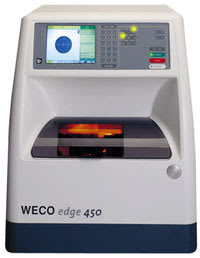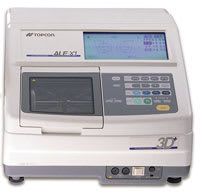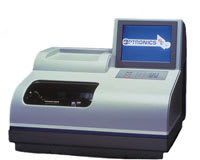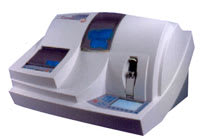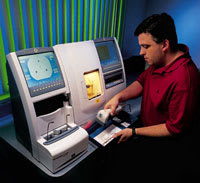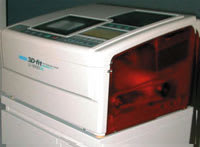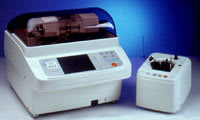As the Lens Turns Get the right kind of edger for your in-house lab by asking the right questions By Erinn Morgan Your frame and lens sales are strong. You have a good relationship with your wholesale lab. Yet your customer base is clamoring for faster turnaround time. Perhaps the time has come to invest in your in-house lab. Once you have decided the time is right to purchase an edger, it is critical that you ask both yourself and the edger manufacturers the appropriate questions. This will ensure that your investment is a wise one and your money is well spent. Product Mix One of the most important initial things to analyze is the type of product mix in lenses that you anticipate processing. For example, if you have a large children's business and process a large volume of polycarbonate, you will want to make sure the machine you purchase has been designed to edge poly lenses as well as other materials.
"You want to understand what your own product mix is," says Michael Urban, product manager of edging equipment at Gerber Coburn. "And then you can ask the right questions. If you do a lot of polycarbonate, it's important to know if the machine you are considering processes polycarbonate the same as, or better than, other machines. You need to ask if this is a machine that barely has polycarbonate processing capability or has it been designed specifically to process poly." Understanding your product mix will also help you cost justify the edger. "Do you dispense a lot of premium lenses?" asks Franco Aluigi, a veteran territory sales manager with Santinelli International. "Do you dispense a lot of progressives or single-vision lenses? There is definitely a greater profit margin in progressives versus single-vision, so your cost savings on processing progressives in house is much higher." Additionally, there are newer machines on the market that process difficult jobs like drill mounts and rimless frames. If you are dispensing more and more of this increasingly popular frame style, a machine that can process such things in-office will certainly reduce your turnaround time to your customer and increase your profit margins.
While there are a variety of edgers that handle different capacities, many will process up to 100 jobs per day-usually far above the number required at most independent dispensaries (although some multi-doctor practices may require this amount). Determining your current requirements is very important, as is having a general idea of your goals for future growth. "A small operation may do 30 to 50 jobs a day, but that number may very well grow in a short period of time," says Urban. "So you may want to consider what kind of growth path the piece of equipment that you are considering will allow." Once you figure out your expected volume, you can figure the amount of time it will take for the machine to pay for itself through profits. "There are many different capacity edgers," says Stu Watson, director of training an technical support at National Optronics. "But it's really about payback-how long it will take to pay for a piece of equipment." Will you have paid off your edger in five years? In 10 years? In one year? Your level of volume plays a big part in that equation." In finishing, you can save about $19 per job on average by doing it yourself," says Watson. "So every 100 jobs you do, it saves $1,900 on your lab bill. You can very simply and quickly determine what your payback will be." How Sophisticated? Some call it "bells and whistles." Others call them necessities. Today's edgers offer a variety of features, some of them quite sophisticated. And many are computerized and can interface with other equipment in your finishing lab. "Most of the edgers have similar functions," says Urban. "Some are faster. Some are smarter when it comes to interfacing. If the edger can communicate to a system to which information can be downloaded automatically, is that appealing?" A more advanced multi-functional edger will also reduce the need to move the lenses from machine to machine to perform all of the necessary functions. "The equipment today is really multi-functional," says Nancy Easton, vice president of Briot. "And this is important because every time you move a lens to a different piece of equipment you increase the handling of the lens and you increase the chances for scratching, dropping, or breaking it. The more sophisticated machines reduce the risk of damage and get the lens into the frame faster." With those sophisticated machines, Easton points out, dispensers don't have to learn how to use several different pieces of equipment-only one edger that has several different functions.
Got Skills? One of the biggest factors to consider when purchasing your edger is the skill level and aptitude of the technicians. What kind of people are you employing to run the lab? Will you have a skilled technician full time or do you expect to have a lot of turnover and a less skilled staff? The answers to these questions will also help determine the type of edger that will best suit your needs. "Ask yourself if you plan to hire people off the street to run a 'plug 'n play' or will you hire skilled people who can handle something more difficult?" says Jeff Wallish, national sales manager at Weco International. This choice, of course, will affect your cost of labor. "If you had to hire an experienced person for $15 an hour versus an entry-level worker for $6 to $8 an hour, that can work out to a difference of $14,000 a year," says Watson. "Over a few years, easier-to-run equipment that may have cost more in the beginning will pay for itself."
Adds Urban, "You should also ask how easy is it to train or retrain people on the machine you are considering. Not all equipment is easy to understand and not all manufacturers offer enough training or additional re-training." Finally, the doctor or dispensary owner must ask himself how much time he wants to spend dealing with running the edger and training staff to run it. How Much Space? In today's retail world where space is at a premium, finding the room for an in-office lab may be difficult. "Space can be an issue," says Urban. "In a lot of practices, they make more money on frame bars than on edger space." Some manufacturers will help in designing an in-office lab for your space. They will provide a layout of how the lab would be set up and how the flow would work, including electrical requirements and options for sink areas.
Manufacturer Reputation One of the most often overlooked factors in buying an edger, say the experts, is the reliability of the equipment company when it comes to warranty follow-up, training, and technical support. "You can ask the company how long it will take them to get to you once you do have a problem," says Wallish. "Also, ask if they have a loaner unit that can be used while the original is out of the office. Once you start processing lenses in-house, you won't like downtime. Therefore, the reliability of a company and its repair system is a very important part of your research." The type of training offered by a company is also critical to research. "Ask what type of training they offer and how long it runs," says Easton. "And check if there is any follow-up to that training via phone. You need to know how you're going to learn to use the machine and how you should take care of it." She also points out that it will be important for a company to offer manuals and training tools for staff questions and training.
Cost Factors What can you afford? The price you will pay for this piece of equipment is certainly one of the most important considerations. Generally, you will get what you pay for. If you want a faster machine with more accuracy and features, it will certainly cost more. "You will pay a bit more for reliability and for better features," says Wallish. "But you get so much more from it. I was visiting one of our recent installations in Houston where the owner had purchased our top-of-the-line edger. It edges and polishes, and makes the holes for drill mount frames that are so popular. He was ecstatic because he said it switched his time management from 70 percent back making jobs and 30 percent on floor to the exact opposite." Certainly, the dispensary is where you make more money, so when you can spend less time in the lab, it is more cost effective. Your business' budget will be a driving factor in this decision, but it is also important to take your future goals into consideration. "Flexibility is a key issue here. If your focus today is polycarbonate but you plan to process other premium lenses in the future, you need a machine can switch materials." You may also want a machine that can process more volume at a faster rate in the future. Or something that can handle drill mounts as you grow that business. Or maybe you want to grow your lab with your practice and plan to interface machines and download information.
All these aspects will be much easier to grow into if you buy the machine now that will offer you that flexibility. The experts suggest that it makes the most sense to focus on the best product that you can afford. "People are generally looking to get the best price they can on finishing equipment," says Easton. "And while it is definitely a wise move to meet your needs today, it is also critical to foresee what changes may and will come down the road. Don't be shortsighted to save a couple of dollars." EB
|
Article
As the Lens Turns
Get the right kind of edger for your in-house lab by asking the right questions
Eyecare Business
September 1, 2000




